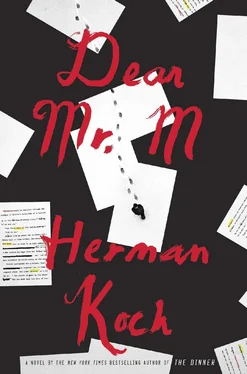In fact, you should see your face when you’re extolling your own intelligence. Your face, and the look in your eyes. It’s the look in the eyes of a rabbit that has misjudged the distance to the other side of the expressway — and realizes too late that the headlights bearing down on it are already too close to dodge. A look, in other words, that doesn’t believe itself for a moment, that’s paralyzed by the fear that the first tricky question will expose it as a fraud, once and for all.
A mediocre writer serves a life sentence. He has to go on. It’s too late to change professions. He has to go on till the bitter end. Until death comes to get him. Only death can save him from his mediocrity.
His writing is “not without merit,” that’s what we say about the mediocre writer. For him, that’s the pinnacle of achievement, to produce books that are not without merit. You really do have to be mediocre to go on living once you’ve realized that. To go on caring about a life like that, that’s what I should really say — to not prefer death.
—
The line at the bookstore wasn’t so bad after all. It had rained a little earlier in the morning, then the sun came out. The people were lined up to the door, but they were all inside. Not a bestselling author’s kind of line. Not a line out to the street, or all the way around the corner, no, just the normal kind of line you’d expect for a writer in whom interest has been waning for the last decade or so. Lots of middle-aged women. Far past middle age, I’m sorry to say — women no one turns to watch as they go past.
I took a copy of Liberation Year off the pile and went to the back of the line. There was a man in front of me. The only man there, except for me. Everything about him told you that he wasn’t there of his own free will, as they say, but that he’d come along with his wife, the way husbands go with their wives to IKEA or some furniture outlet. At first the man feigns patient interest in an adjustable bed frame or a chest of drawers, but before long his breathing grows labored and he begins tossing increasingly desperate glances toward the checkout counters and the exit, like a dog smelling the woods after a long trip in the car.
And it was his wife who was holding your book, not him. Women have more time than men. Once the vacuuming is done they open a book — your book — and start to read. And that evening in bed they’re still reading. When their husband rolls onto his side and places a hand on their stomach, close to the navel or just below the breasts, they push that hand away. “Leave me alone, okay, I just want to finish this chapter,” they say, then read on. Sometimes women have a headache, sometimes they’re having their period, sometimes they’re reading a book.
Again, I’m not going to attempt to describe your face. The expression you wore when I put my copy of Liberation Year on the table for you to sign. Suffice it to say that you looked at me the way you look at someone you’ve never seen anywhere but on the other side of a counter. Across the counter at the drugstore, for example, the cashier you suddenly run into on the street: you recognize the face, but have no idea where from. Without the context of the counter, the razor blades, and the painkillers, you can’t place the face.
“Is it for someone special?” you asked, the same way you’d asked the people in front of me. Meanwhile, you looked at my face. The face that seemed familiar to you, but that you still couldn’t pin down.
“No, it’s for myself.”
You sign with a fountain pen. A fountain pen you screw the cap back onto after each signature or personal inscription. You’re afraid that otherwise it will dry up. You’re afraid that you yourself are going to dry up; that’s what a dime-store psychologist might conclude, before going on to ask you more about your parents and your childhood.
“And the name is—?” The cap was already off, the fountain pen already poised above the title page, when suddenly I thought about something. I looked at your hand holding the pen, your old hand with the clearly visible veins. As long as you continue to breathe, the blood will keep on transporting oxygen to your hand — that’s also how long you’ll be able to sit at a table in a bookstore and sign books that are not without merit.
What I thought about was this: I thought about your face poised above your wife’s face, your face in the semidarkness of the bedroom, your face as it slowly approaches hers. I thought about it from her perspective, how she sees that face approaching: the bleary old eyes, the whites of them not completely white anymore, the chapped and wrinkled lips, the old teeth, not yellow but mostly gray, the smell that passes between those teeth and reaches her nostrils. It’s the same odor you smell when the sea pulls back, leaving behind it on the beach only algae and empty mussel shells.
The odor is so strong that it overrides the normal, old-man smells: the smell of diapers, of flaking skin, of dying tissue. Yet, a little more than three years ago, there must have been a night when she saw a future in all of that. A night when she decided that having a child by that uncongenial-smelling face could be regarded as an investment.
That your wife was able to see a future, I can almost believe that. But what kind of future did you see? She saw a child that would grow first inside, then outside, her body. But what about you? Did you see yourself waiting at the gate of the elementary school, later, amid all the young mothers? As an admittedly old but famous father? Did your fame, in other words, make you free to bring a child into the world at a ridiculously advanced age?
Because what future awaits her, your daughter? All you have to do is look at the calendar. That future, namely, doesn’t exist. Even if it all goes unexpectedly well, from a point somewhere halfway through high school she’ll have to make do with nothing but the memory of her father. In the middle of those “difficult years.” Those same difficult years during which her mother once knocked on your door in her capacity as reporter for the school paper.
You spoke my name, and once again looked at me with that gaze in which — somewhere far away — something like recognition had begun to dawn. As though you heard a song that sounded vaguely familiar, but you couldn’t come up with the name of the singer.
Your fountain pen scratched across the page. Then you blew softly on the letters before closing the book — and I smelled the odor. You’re almost done for. One signature, one inscription on a title page separates you from the grave and oblivion. That’s another thing we need to talk about: the future, after you’re gone. I could be mistaken, of course, but my impression is that it will go quickly. In southern countries, the dead are buried the very same day. For reasons of hygiene. The pharaohs were wrapped in bandages and buried along with their most prized possessions: their favorite pets, their favorite wives…I think it will look something like that. The Big Forgetting will begin the very same day. You will be buried along with your work. Of course there will be speeches, and the list of speakers will be impressive enough. Full or half pages in the papers will be dedicated to the importance of your oeuvre. That oeuvre will be collected in a leather-bound, seven-volume edition, subscriptions to which are open even as we speak. And that will be that. In no time, separate volumes of the luxury edition will start popping up at secondhand book sales. The people who have subscribed won’t show up to collect the series — or they’ll be dead — on the day it appears.
And your wife? Oh sure, she will go on playing the widow for a while. Maybe she will even play hardball and forbid some biographer to cite from your personal correspondence. But that doesn’t seem like a very realistic scenario to me. Guarding access to correspondence is more the kind of thing the older widows do. The widows with no future. Your wife is young. It won’t be long before she starts thinking about a life without you. She probably already thinks about that with some regularity.
Читать дальше












